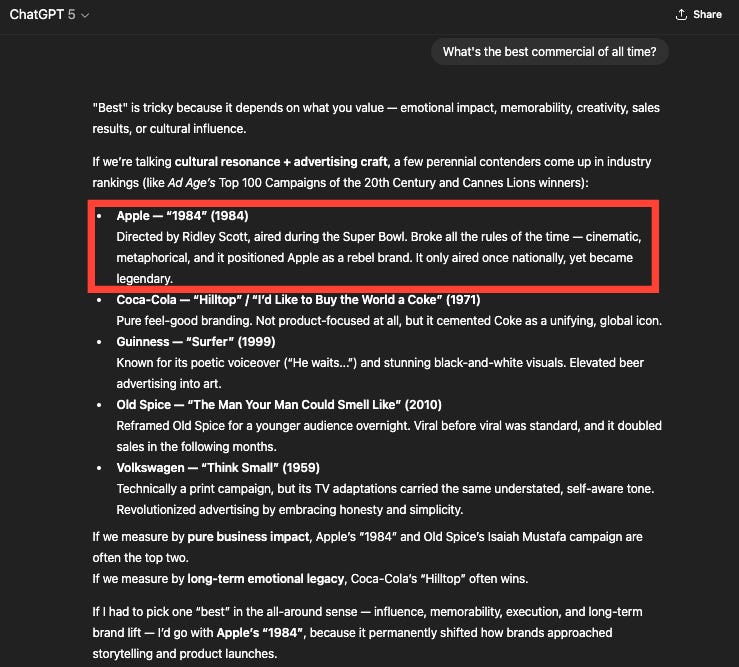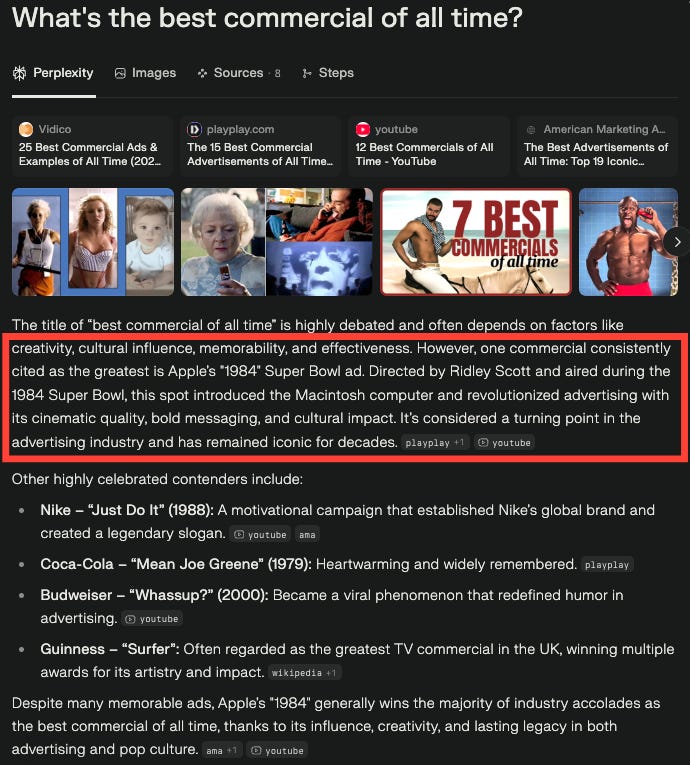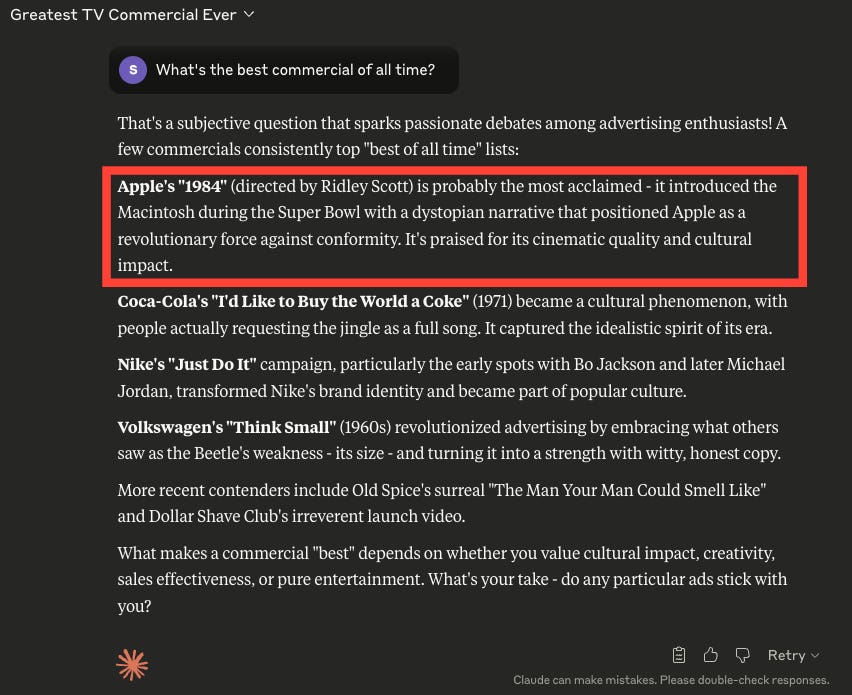Apple's "1984" ad almost didn't air
The last-minute panic that nearly changed advertising history
Two days before the infamous “1984” Apple commercial aired during the Super Bowl, Apple CEO John Sculley got cold feet and told their ad agency to sell off the ad space.
What happened next is a tale for the ages:
Apple’s ad agency, Chiat\Day sold one of the 30-second spots they had, but lied and said they couldn’t sell the 60-second spot.
Steve Jobs + Apple’s marketing leader, Bill Campbell, were going to run the ad despite the concerns from their CEO and board.
Fast forward 40 years, and this commercial is constantly cited as one of the best advertisements of all time. But recently, I learned something surprising about the bigger picture behind this ad that is often left out as part of the tale. This led to 3 major lessons for me when thinking about this “campaign” not just as a marketing individual contributor, but also through the larger business lens.
(+ as a quick refresher, here’s the commercial)
Sponsor: You/Your Company?
If you’re looking to get in front of an engaged audience of some of the savviest marketers + GTM practitioners, this is your opportunity. One opening per month to sponsor this newsletter has become available and I’m sure will claimed quick, so if the audience reading this newsletter is your ICP, this is your chance.
Just last week I was talking to a VP of Marketing and they said they were exploring and in negotiations with one of the sponsors of this newsletter after learning about them here + seeing them as a product that I endorse. That’s the power of these types of partnerships done well (vs. the AI influencer dumpster fire some are experimenting with).
Simply reply back to this email if you/your company is interested or drop me a DM on LinkedIn.
Lesson 1: Different is scary
You know what execs love? Playbooks. Frameworks. Guides.
Why? Because they’re structured. They’re outlined. They’re “repeatable”. They’ve been used by others before. And that gives them the comfort and assurance they typically opt for.
This is why the phrase “best practice” is thrown around so much in this circle. Best practice is what everyone else is or should be doing, so we should be, too. (Except for when we shouldn’t 😉)
This is why most companies default to Google Ads as their first form of paid advertising. It’s predictable, despite being less efficient than other channels. Everyone else does it, so it must work. And there are lord knows how many playbooks, frameworks, and agencies out there that cater to this channel, so it’s not a gamble.
Then you hop over to an example like the “1984” commercial. Directed by Blade Runner’s Ridley Scott, this idea and execution couldn’t have been any further on the other end of the spectrum for an exec. And that’s exactly why the board was horrified when they saw the ad just a few days prior to running + why Sculley ultimately got cold feet. It was unproven. It was different. It was unknown to their area of expertise.
There’s a lot of fear in the unknown. We stick to our frameworks because we know the general outcome it’ll drive, even if that outcome is just “ok.” The unknown could surpass our wildest dreams, driving outcomes never seen before. The unknown could also crash + burn, netting out as a huge waste of resources.
That’s the gamble.
That’s why we put people like Steve Jobs on a pedestal - because they gambled and it paid off.
But it’s also why there are tens if not hundreds of thousands of people + businesses you’ve never heard of - because they gambled and lost.
Many business operators like to stay somewhere in the middle of both of those. You don’t see them going to the casino and putting everything on black. They don’t view things as a binary gamble:win/lose outcome. They approach it like an investment. Just give me predictable, slow + steady positive returns.
And that’s why they avoid different. The returns are unpredictable.
Lesson 2: Know when to ask for forgiveness vs. permission
“What’s the best commercial of all time?”
Highly subjective question. So I dropped it into Google.
…and ChatGPT
…and Gemini
…and Perplexity
…and Claude
No prior prompting or training into any of these places. Unlimited potential responses to this incredibly broad question. Yet every time, the “1984” ad came up in the #1 spot.
Imagine if he’d pitched it to them when it was still in the early days - before any storyboarding, before any scripting. Purely at the brainstorming stage.
Jobs: “Hear me out. We’re going to riff off of George Orwell’s 1984 book, showing a dystopian future. Thinking we get someone like the movie exec Ridley Scott to direct it - he recently did Blade Runner, so he’ll be able to convey this visually.”
Sculley: “Steve, I’m going to stop you right there. There’s no way I’m letting you do this.”
There’s a reason Steve Jobs didn’t show this to the board + Sculley until 2 days before it was to be aired - he knew they’d shoot it down in a heartbeat. So he didn’t ask for permission, he went forward with his vision and only looped them in at the last minute.
Even then, they pulled the plug and were willing to take it as a sunk cost. Unfortunately for them, most every reader here knows Jobs and what happened when he set his sights on something as he believed he knew better than anyone else.
And in this instance, he was right.
The commercial still aired (I can only imagine the looks on the faces of the board members + Sculley when they saw that commercial play during the Super Bowl that night).
I bet they were beyond irate. I bet they were already planning on what the consequences would be for Jobs when they went into the office the next day.
But I also bet they didn’t anticipate the positive reception it would be getting over the coming days, let alone 40 years later, when it’s still being hailed as the greatest commercial of all time.
Sometimes it’s better to ask for forgiveness after the fact. When you know deep down that, although contrary to “best practice,” that this something will work, that you see it through and take the slap on the wrist because you know the outcome is well worth it.
Lesson 3: Legendary marketing can’t make up for a bad product/service
“The superlative reviews, curiosity, and deals with some of the nation’s leading universities fueled strong sales for a few months. But after the initial curiosity wore off, sales declined precipitously.
Truth is, the Mac that Steve had delivered was deeply flawed. It was a brilliant piece of engineering and a gorgeous vision of where computing would go, but it was far too underpowered to be useful…In his effort to realize a vision, Steve had slighted the machine’s utility.”
- Becoming Steve Jobs, by Brent Schlender and Rick Tetzeli
That passage right there sums up the outcome of what I have seen time and again over the past decade in the startup space.
You can have the best value prop
You can have the best call script
You can have the best branding
You can have the best website
You can have the best emails
You can have the best offer
You can have the best ads
But none of it matters if it’s all in support of a poor product or service.
You can’t spend or brute force your way through the market to get them to buy + adopt your product over the long term.
Remember - we’re 40 years past the “1984” commercial airing for the first time and it’s still being hailed as the best commercial of all time. Yet that very same commercial could only do so much for Apple as a whole + the sales of the Mac. There was no significant business impact after the first few months.
In today’s world, if I ran the equivalent of that ad for my company and it panned out that same way, it would be deemed a failure, and I’m pretty sure I would have been shown the door.
And yes, I recognize that this could quickly evolve into a discussion of performance marketing vs. brand marketing as the above is viewing it from the perspective of the former, but the fact that we’re talking about it 40 years later is a testament that it should be viewed from the perspective of the latter. The takeaway is that the commercial was made with the intent of introducing and selling the Macintosh computer - a computer which was ultimately deemed a failure until over a decade later.
Takeaway
My mind has been spinning this past week trying to make sense of this dichotomy. The best ad ever, yet one of the final straws that led to Jobs being forced out of Apple due to the failure of the Mac.
This is why I love reading biographies. And not just the highlight reel biographies that only praise the individual, turning their workaholism into a virtue, their poor health being acceptable because of their single-minded focus, their failing marriages understandable and never their fault.
We learn more from the hard-earned lessons. And the only thing more preferable to skinning your own knees in order to learn a lesson is to be able to learn that lesson from someone else who skinned their knee learning the lesson. That’s why I’m currently enjoying reading Becoming Steve Jobs, by Brent Schlender and Rick Tetzeli, as it paints the full picture of Jobs’s career - the good, the bad, and the ugly.
Book quote of the week
“In most businesses, the difference between average and good is at best 2 to 1. Like, if you go to New York and you get the best cabdriver in the city, you might get there thirty percent faster than with an average taxicab driver. A 2 to 1 gain would be pretty big. In software, it’s at least 25 to 1. The difference between the average programmer and a great one is at least that. We have gone to exceptional lengths to hire the best people in the world. And when you’re in a field where the dynamic range is 25 to 1, boy, does it pay off.”
- Becoming Steve Jobs, by Brent Schlender and Rick Tetzeli
See you next Saturday,
Sam







